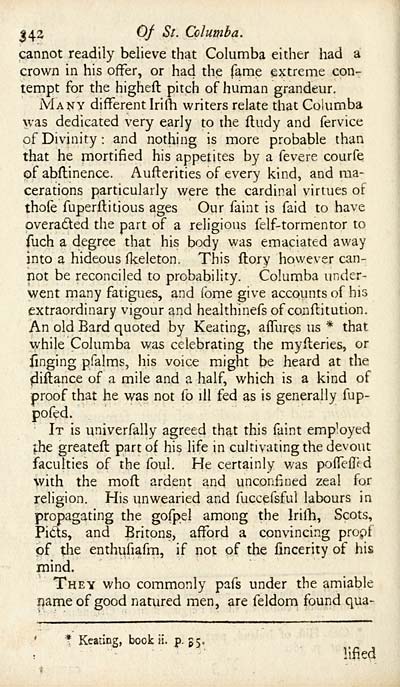Blair Collection > Critical dissertations on the origin, antiquities, language, government, manners, and religion, of the antient Caledonians, their posterity the Picts, and the British and Irish Scots
(380)
Download files
Complete book:
Individual page:
Thumbnail gallery: Grid view | List view

142 0/ Sl Cclumba.
cannot readily believe that Columba either had a
crown in his offer, or had the fame extreme con-
tempt for the higheft pitch of human grandeur.
Many different Irirti writers relate that Columba
was dedicated very early to the ftudy and fervice
of Divinity : and nothing is more probable than
that he mortified his appetites by a fevere courfe
of abflinence. Aufterities of every kind, and ma-
cerations particularly were the cardinal virtues of
thofe fuperftitious ages Our faint is faid to have
overacted the part of a religious felf-tormentor to
fuch a degree that his body was emaciated away
into a hideous fkeleton. This flory however can-
not be reconciled to probability. Columba under-
went many fatigues, and fome give accounts of his
extraordinary vigour and healthinefs of conflitution.
An old Bard quoted by Keating, alfures us * that
while Columba was celebrating the myfteries, or
fmging pfalms, his voice might be heard at the
jdiflance of a mile and a half, which is a kind of
proof that he was not fo ill fed as is generally fup-
pofed.
It is univerfally agreed that this faint employed
;he greatefl part of his life in cultivating the devout
ifaculties of the foul. He certainly was poffeflfd
with the mofl ardent and unconfined zeal for
religion. His unwearied and fuccefsful labours in
propagating the gofpel among the Irifh, Scots,
Pids, and Britons, afford a convincing propf
of tiie enthufiafm, if not of the fmcerity of his
inind.
They who commonly pafs under the amiable
name of good natured men, are feldom found qua-
* Keating, book ii. p. 55.
lified
cannot readily believe that Columba either had a
crown in his offer, or had the fame extreme con-
tempt for the higheft pitch of human grandeur.
Many different Irirti writers relate that Columba
was dedicated very early to the ftudy and fervice
of Divinity : and nothing is more probable than
that he mortified his appetites by a fevere courfe
of abflinence. Aufterities of every kind, and ma-
cerations particularly were the cardinal virtues of
thofe fuperftitious ages Our faint is faid to have
overacted the part of a religious felf-tormentor to
fuch a degree that his body was emaciated away
into a hideous fkeleton. This flory however can-
not be reconciled to probability. Columba under-
went many fatigues, and fome give accounts of his
extraordinary vigour and healthinefs of conflitution.
An old Bard quoted by Keating, alfures us * that
while Columba was celebrating the myfteries, or
fmging pfalms, his voice might be heard at the
jdiflance of a mile and a half, which is a kind of
proof that he was not fo ill fed as is generally fup-
pofed.
It is univerfally agreed that this faint employed
;he greatefl part of his life in cultivating the devout
ifaculties of the foul. He certainly was poffeflfd
with the mofl ardent and unconfined zeal for
religion. His unwearied and fuccefsful labours in
propagating the gofpel among the Irifh, Scots,
Pids, and Britons, afford a convincing propf
of tiie enthufiafm, if not of the fmcerity of his
inind.
They who commonly pafs under the amiable
name of good natured men, are feldom found qua-
* Keating, book ii. p. 55.
lified
Set display mode to: Large image | Transcription
Images and transcriptions on this page, including medium image downloads, may be used under the Creative Commons Attribution 4.0 International Licence unless otherwise stated. ![]()
| Permanent URL | https://digital.nls.uk/76290791 |
|---|
| Description | A selection of books from a collection of more than 500 titles, mostly on religious and literary topics. Also includes some material dealing with other Celtic languages and societies. Collection created towards the end of the 19th century by Lady Evelyn Stewart Murray. |
|---|
| Description | Selected items from five 'Special and Named Printed Collections'. Includes books in Gaelic and other Celtic languages, works about the Gaels, their languages, literature, culture and history. |
|---|

